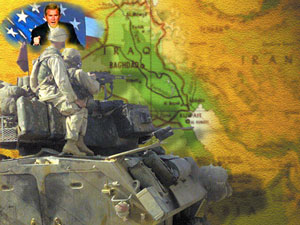JIM.LOBE
- Why is the military building ‘permanent’ bases? (FCNL)
- Graphical Overview of Iraq’s Oil fields and facilities (Image)
- Iraq: Permanent US Colony (Dahr Jamail, 03-14-2006)

WASHINGTON (IPS/GIN) – President George W. Bush appears to have rejected the Iraq Study Group’s call to pledge not to establish permanent military bases in Iraq.
White House spokesman Tony Snow recently confirmed that Pres. Bush favors a “Korean model” for Iraq in which Washington would provide “a security presence” and serve as a “force of stability [for] a long time.” Mr. Snow’s statement spurred new questions about the administration’s aims in Iraq and whether Bush intends to set up a permanent military presence there.
Adding to the speculation were remarks made May 31 by Defense Secretary Robert Gates and the overall field commander of U.S. forces in Iraq, Lt. Gen. Raymond Odierno, wherein both officials suggested that Washington favors a protracted, if not permanent, troop presence in Iraq similar to the U.S. presence in South Korea. A minimum of 30,000 U.S. soldiers have been deployed to bases in South Korea since the Korean War more than 50 years ago.
“I think it’s a great idea,” Lt. Gen. Odierno told reporters during a video conference from Baghdad, when asked about following a similar strategy in Iraq.
“That would be nothing but helping the Iraqi security forces and the government to continue to stabilize itself and continue to set itself up for success for years to come, if we were able to do that,” he said.
Meanwhile, Secy. Gates said the presence of “some force of Americans … for a protracted period of time” would help reassure U.S. allies in the region that Washington would not abandon them.
The Korea analogy has spurred some consternation among analysts in Washington. Most experts are aware that when Iraqis have been surveyed on their views about permanent military bases in their country, the response–except among the minority Kurdish population–has been overwhelmingly negative.
Experts also reject the notion that the situation in Iraq, where U.S. forces find themselves in the middle of a number of internal sectarian conflicts, bears any relation to that of South Korea, where a minimum to 30,000 U.S. troops have been deployed as a “trip-wire” along the demilitarized zone to deter North Korean forces on the other side for more than 50 years.
The analogy is “either a gross oversimplification to try to reassure people [that the administration] has a long-term plan, or it’s just silly,” said retired Lt. Gen. Donald Kerrick, a former deputy national security adviser who served two tours of duty in South Korea.
In recommending that Pres. Bush explicitly renounce a permanent military presence in Iraq last December, the 10-member Iraq Study Group, which was co-chaired by former secretary of state James Baker and former Rep. Lee Hamilton, D-Ind., argued that such a declaration would reassure two key constituencies.
“The United States can begin to shape a positive climate for its diplomatic efforts, internationally and within Iraq, through public statements by President Bush that reject the notion that the United States seeks to control Iraq’s oil, or seeks permanent military bases within Iraq,” it said, urging Pres. Bush to affirmatively “state that the United States does not seek permanent military bases” there.
Congress has also implicitly encouraged the administration to make such a commitment. In the last two years, it has passed two laws that prohibit the government from spending any money to establish a permanent U.S. military presence in Iraq.
Yet, as the latest statements suggest, Pres. Bush has ignored these calls, while the Pentagon, which has been turning over smaller military bases to Iraqi forces in a number of provinces in the past year, has built up and retained four “super-bases” around the country. The bases are capable of housing tens of thousands of military personnel.
In congressional testimony in early 2006, then-chief of the U.S. Central Command, Gen. John Abizaid, laid out a number of reasons why Washington would want to retain at least permanent access to those bases. At the time, however, he stressed that a policy regarding the United States’ long-term presence in Iraq had not been formulated.
In particular, he cited the “need to be able to deter ambitions of an expansionistic Iran,” to ensure the “free flow of goods and resources on which the prosperity of our nation and everybody else in the world depend,” and to carry out counterterrorist operations.
Given prevailing popular sentiment in Iraq, maintaining a permanent military presence there could also undermine Washington’s ostensible goal to promote democracy there, according to Charles Smith, an expert on the Gulf at the University of Arizona.
“This model requires the approval and cooperation of an Iraqi government, the gaining of which is highly doubtful. So if the U.S. wants official approval, it will have to place its own man in power and keep [him] there by force,” he said. “In that case, the model to refer to is South Vietnam in the early 1960s, and we all know what happened there.”












